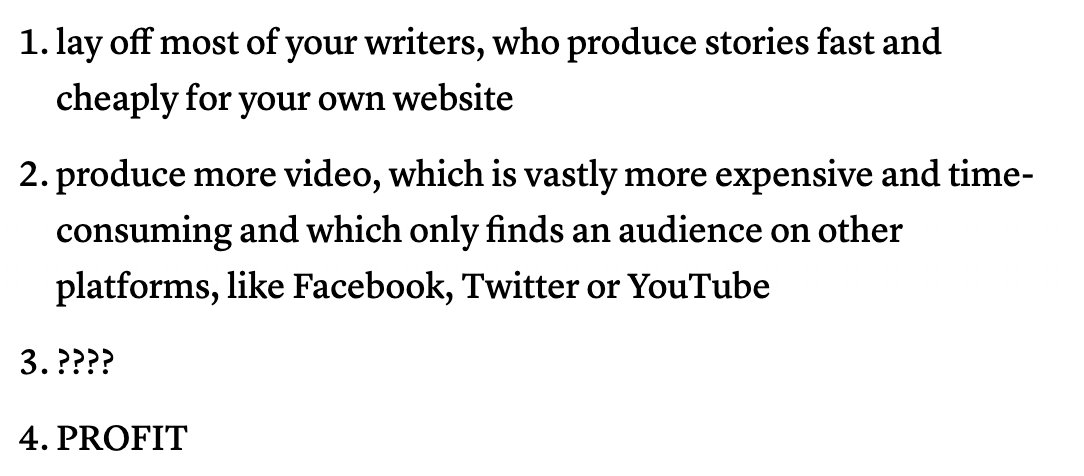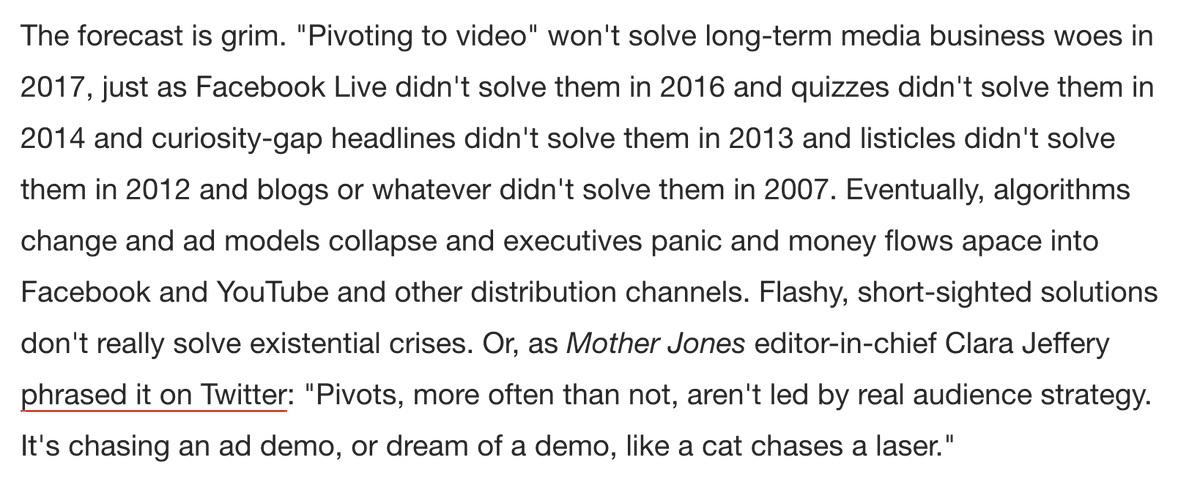So I just hit & #39;Publish& #39; on a newsletter I& #39;ve been meaning to write, in one form or another, for a long time. http://tinyletter.com/networked/letters/video-was-never-the-answer">https://tinyletter.com/networked...
It& #39;s narrowly about the infamous & #39;pivot to video& #39; that took place in 2016 and 2017. But more broadly, it& #39;s about the news industry& #39;s collective inability to look itself in the mirror and admit it screwed up, when it& #39;s easier to just blame Facebook or Google instead.
None of which is to say we shouldn& #39;t blame Facebook or Google for (many) things. There is *plenty* to complain about, and those complaints may well become the basis of antitrust litigation or, at the very least, regulatory enforcement.
But I chose the pivot to video because it& #39;s an example of a decision that many news outlets jumped into headfirst, despite ample evidence, and considerable warnings, from a wide array of sources that this was a bad idea and even worse strategy.
As @moorehn memorably put it: https://www.cjr.org/business_of_news/pivot-to-video.php">https://www.cjr.org/business_...
But I think the pivot to video is a particularly useful example because it& #39;s just one in a long line of decisions for which publishers blindly followed Facebook (and/or Google) down a proverbial dead end.
Way back in June 2017, @zzzzaaaacccchhh nailed the long-term trend: https://www.newsweek.com/mtv-news-video-vocativ-media-ads-pivot-630223">https://www.newsweek.com/mtv-news-...
And in the specific case of the pivot to video, the warnings were glaring and numerous. In June 2016, @joshtpm tweetstormed about it, declaring that "the reality is that news consumers don& #39;t want video." https://twitter.com/joshtpm/status/746851693338501121">https://twitter.com/joshtpm/s...
In January 2017, @Chronotope said much the same: "Just watch literally any user of your site to determine that video is less effective than its endless boosters keep saying." https://twitter.com/Chronotope/status/819960821119848448">https://twitter.com/Chronotop...
In June of that same year, @bafeldman wrote that "the lesson of MTV News and its similarly pivoted peers may simply be that profit-seeking start-ups...are poor patrons of ambitious, sophisticated, politically driven journalism." https://nymag.com/intelligencer/2017/06/the-lesson-of-mtv-news-is-not-that-longform-is-dead.html">https://nymag.com/intellige...
The signs were all there. And it was happening elsewhere as well. In June 2016 I wrote about the pivot to video, yes, but also Instant Articles, noting that "it is unclear what news organizations received in return" for signing up. http://blog.jaypinho.com/2016/06/20/video-is-not-your-savior/">https://blog.jaypinho.com/2016/06/2...
A year later, @CaseyNewton would have the answer: https://www.theverge.com/2017/4/16/15314210/instant-articles-facebook-future-ads-video">https://www.theverge.com/2017/4/16...
I don& #39;t pretend to know how to fix journalism. (I wish I did!) But I think it& #39;s enormously importantly to try, and part of that is -- to borrow @benthompson& #39;s line -- "media organizations have to be honest with themselves about why they are struggling." https://stratechery.com/2020/media-regulators-and-big-tech-indulgences-and-injunctions-better-approaches/">https://stratechery.com/2020/medi...
Does this mean publishers should continue to report on Facebook& #39;s and Google& #39;s takeover of online revenue? Their potentially anticompetitive tactics? Their cavalierness about misinformation? Yes, yes, and yes.
But it also means owning up to their own failures, and learning from them, and understanding that journalism doesn& #39;t scale like a tech company: http://blog.jaypinho.com/2017/10/09/some-things-dont-scale/.">https://blog.jaypinho.com/2017/10/0... Nor can journalism build a sustainable business model based on relying on a tech company.
Anyway, I& #39;ll stop there. If you like what you see (or hell, even if you don& #39;t), please subscribe! Thank you. https://tinyletter.com/networked ">https://tinyletter.com/networked...

 Read on Twitter
Read on Twitter




